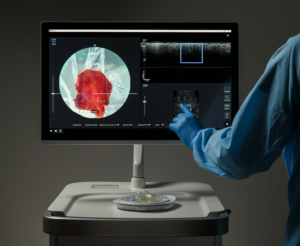Clinical Study to Evaluate Perimeter’s Next Generation OCT Imaging Platform with AI
Recognizing the unmet need in the field of breast cancer margin visualization, Perimeter has conducted a randomized, controlled trial (RCT) to assess the efficacy of the next generation of Perimeter’s commercially available flagship device. The objective of this multi-site pivotal trial was to evaluate adjunctive use of Perimeter B-Series OCT8 with ImgAssist AI against the current standard of care alone and assess the impact on re-operation rates for patients undergoing breast conservation surgery.



